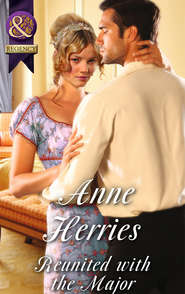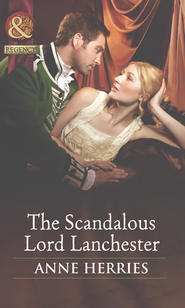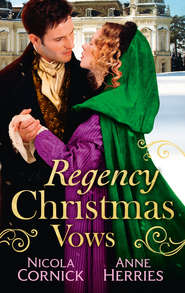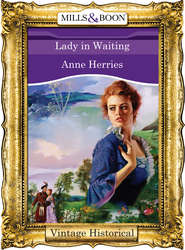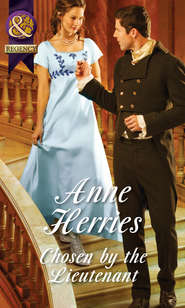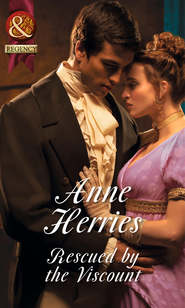По всем вопросам обращайтесь на: info@litportal.ru
(©) 2003-2024.
✖
The Rebel Captain's Royalist Bride
Автор
Год написания книги
2018
Настройки чтения
Размер шрифта
Высота строк
Поля
Surely he could not be attracted to a woman he had met only this day? No, it was foolish, ridiculous...a betrayal of Jane. And yet there had been something the moment he saw her, and, as he’d watched her working, his first feeling had not been reversed that here was a remarkable young woman.
A woman who might help him to live again, perhaps?
Even as the thought entered his mind, he crushed it ruthlessly, a wave of such intense grief sweeping through him that he gasped. What a rogue he was to contemplate caring for a woman when his beloved lay in her grave.
‘Forgive me, Jane,’ he whispered. ‘I shall never love any other woman, for you were my heart and my soul.’
In time he might marry, for a man could not live his life alone, but he would choose a widow who wanted only a home and comfort. He could not give more...even to the girl whose eyes had seemed to pierce the shield he had built to shut out his grief and despair.
Chapter Two
Babette glanced out of the kitchen window, though she was not precisely sure what she sought or why. Captain Colby, for such his men called him, had been out with her uncle and half of his men all that afternoon. As she stood at the window, she saw they were returning, her uncle and the rebel captain riding side by side as they entered the courtyard. One of the men was driving a wagon filled with sacks and leading two bullocks at the back of the cart. Clearly their expedition had been successful, though she could see no sign of the horses they needed, but then, most of the neighbouring farms had only the horses they used for riding or work in the fields. Her father had kept a fine stable at the castle, but Babette had brought only her favourite mare when she’d come to the manor house.
As she watched, Captain Colby dismounted, and a servant took his horse. He glanced towards the kitchen, as if seeking something, and Babette’s heart leapt. How foolish! He did not look for her. Why should he? Besides, she did not wish him to notice her. He was too arrogant—her enemy.
She and her aunt had been busy baking all the afternoon, for with so many extra guests they would need to provide more bread and pies if they were to feed hungry men. Angelina had made some custard tarts, but her task was mainly peeling and chopping the vegetables that would go into the stewpot. The big black pot hung on a tripod over an open fire and the main ingredient in this night’s meal was mutton, cooked long and slow to make it tender, with bacon, onions, dried beans, herbs, carrots, leeks and turnips, cooked out to add thickness to the gravy. Also large dumplings made from flour and suet, which were filling and would satisfy hungry men.
Babette had sipped the gravy and she knew that the food tasted delicious. In winter she would also have added potatoes to the mix towards the end of the cooking time, but their stores of those precious roots had been used before the spring was out and there would be no more until the next harvest this autumn.
For pudding there were stewed plums she had picked that day from the orchard, custard, pastries sweetened with honey and a quince preserve. Besides these dishes there would be fresh bread, butter and soft white cheese from their own cows. It was truly a feast fit for any man. Aunt Minnie bemoaned the fact that she had no pig pies or trotters to offer as delicacies, but Sir Matthew never killed a pig unless there was an R in the month, for the meat would spoil too soon.
Glancing through the small-paned kitchen window again, Babette saw the rebel captain washing his face and hands beneath the pump before turning to walk up to the house. She averted her head quickly, her heart’s strident beat bringing a flush to her cheeks. Rather than let him think she had been watching him, she loaded a tray with bread, cheese and butter and took it through to the parlour, setting it on a side table of oak. Earlier, Angelina had laid places on the long refectory table for the family, their female servants, Jonas and the captain.
Babette straightened a chair, casting her eye over the fare laid out. The cold food would be close at hand and either she or her aunt would serve the men with the hot dishes before sitting themselves, while the servants waited to serve themselves once the family were seated. Babette had found her uncle’s habit of eating at the same table as his servants odd at first, for her father’s hall was much larger than this parlour and though everyone ate in the same room there was a distance between the lord and his followers. However, she was not at the castle. She had grown used to supping with the servants, but fervently hoped that she would not be seated next to their guest. The less she had to do with him the better. He had a way of looking at her that made her stomach clench and might make it impossible for her to eat her meal.
However, Aunt Minnie had other ideas and she directed the stranger to take the seat of honour, next to her husband and therefore on Babette’s right hand. He politely stood until she sat, pulling out her stool so that she could take her place. Only her aunt and uncle had chairs with backs, another thing that had taken some getting used to when she first came here. At the castle she had a chair of her own, with a straight plain back and two arms to place her elbows. In her bedchamber, her chair had cushions she had embroidered herself, but her father would have thought it too soft to use at table, for one sat up straight to eat and did not slouch.
Babette saw the stranger frown as he realised that she had a stool, as of course he did since there were no other chairs. Perhaps he was not used to using them and felt discomfort in the arrangement?
Her uncle said grace as usual. Aunt Minnie rose after grace had been said and fetched the large tureen of stew from the side table, which she ladled into earthenware dishes for the men, before serving Babette, her daughter and herself. Babette offered bread to everyone, and Maria poured ale into mugs. Sir Matthew seldom had wine at table, for it was mostly sour and needed to be sweetened with honey, unless they were fortunate to have French wine, which tasted smoother. Good wine was expensive and saved for times of celebration and the family drank Aunt Minnie’s homebrewed ale. This evening, though, a rough red wine was offered to their guest, and Sir Matthew drank wine himself, though both Babette and her aunt preferred the weak ale they normally drank.
As she retook her seat, Captain Colby stood once more, insisting on placing her chair for her. Babette’s cheeks flushed; he was their guest and should not wait on her, but as she looked at her uncle she saw approval in his eyes. Feeling the flutter in her lower stomach, Babette murmured her thanks, but avoided the soldier’s eyes.
Taking her seat once more, Babette looked down at her trencher. She was very conscious of the man sitting beside her and noticed that he merely sipped his wine and then reached for the glass of fresh spring water that one of the women had placed for him. They were fortunate in having such pure water from their own spring. In towns and cities, Babette had heard it was dangerous to drink the water, for it was often contaminated, but theirs was pure and sweet and she saw the appreciation in the way their guest drank deeply of his.
‘You do not drink wine, mistress?’ he asked as he saw her sip her ale and then the water.
‘I prefer a sweeter variety than my uncle’s cellar can provide, sir.’
He nodded, and she thought that perhaps he felt the same, though would not say. ‘Your aunt’s home brew is most pleasant to the taste.’
‘Yes, sir. Like the water it has been cooled, for Aunt Minnie considers it more palatable thus.’
Again he nodded, as if agreeing. She knew that her aunt kept a good table and no one could object to the food, but her uncle was careful with his silver and would not pay the high price many wine merchants asked for the sweet French wines.
‘Did you have a good day, sir?’ she asked out of a need to make conversation. He turned his sombre gaze on her, and she felt her throat catch under his dark scrutiny.
‘We made some purchases, but hardly enough for our needs. We require much more flour and certainly more pigs and cattle, but your uncle’s friends had little to spare. We were not offered one horse.’
‘Perhaps in a few weeks when the harvest is gathered there will be more, sir. I fear there are few spare horses—but perhaps later this year if the travelling people bring their horses to the fair. Sometimes they have pure Arab bloodstock, but whether they would part with them is uncertain.’
‘Yes. I believe the fairs would be the best source in normal times, but the travelling folk are avoiding the fairs now that the country is at war, I think.’ He looked grim. ‘It was my hope and that of some others that we might retain the goodwill of the landowners and farmers by buying produce, but if we are offered so little...’
Babette felt a tingle of alarm as he left the rest unsaid. She had heard that in some parts marauding soldiers had stolen cattle and grain, burning what still stood in the fields as a punishment to those who resisted. But the tales were vague and it had not happened here as yet.
‘If Parliament is for the right of the people, how can you justify taking what people have toiled all year to produce without payment?’
‘That is precisely my argument, mistress,’ he replied and smiled at her in a way that had her tingling right down to her toes. ‘An army must be fed and there are those who say we must take what we need if we cannot persuade. However, for myself I shall also give payment where payment is due.’
Babette could not fault his reasoning, though she knew that most of the small farmers who helped her uncle to gather his harvest, and whom Sir Matthew helped in return, would produce only enough to feed themselves and their people throughout the year. The large landowners might have surplus corn, but hardly anyone had much to spare. Perhaps if the trees were laden with apples they might take some baskets to market, but as far as the grain, cows and pigs were concerned they raised only enough for their own needs. In times when the harvest was generally poor there was often not enough to go round and the poorest families might go hungry through the winter.
Sir Matthew had a large flock of geese, also several ducks and chickens. He did sometimes give a goose to a neighbour at Christmas and sometimes at that time of year he killed perhaps ten of his flock and took them to the market, but even if the rebels took the whole flock it would hardly be enough to feed the number of men she’d heard had rushed to join the Parliament’s army.
‘Some of our men have gone home to harvest their fields,’ Captain Colby was speaking to Sir Matthew now, leaving Babette to her thoughts. ‘It is necessary work, for if the wheat and oats were left to rot in the fields their families might starve, but it does not please Cromwell.’
‘Is Cromwell not a farmer himself?’
‘Aye, he is that, but he will not release the men who follow him this year and insists the women and old men, children and the infirm must gather in the harvest.’
‘His attitude must be much resented?’ Babette suggested.
He turned to look at her, his quiet grey eyes thoughtful. ‘Perhaps by some, but he is admired and respected, some say loved, by the army. He speaks of more discipline needed amongst the ranks and of turning his men into battle-ready troops rather than a disorganised rabble.’
‘I do not know the man,’ Sir Matthew said. ‘I believe he lives in Cambridgeshire? Here in Sussex his name has reached us, though as yet we have seen little of your fellow officers, Colby.’
‘Do you intend to stay long, sir?’ Babette asked when her uncle had turned to speak to Jonas.
‘A few more days. I should like at least two cartloads of grain and another six or more cattle to send back to the quartermaster before I move on to the next location. Since your uncle has kindly offered us a place to sleep, we have decided to make our headquarters here while we see what is on offer to us.’
A few more days... she thought.
Babette nodded, but made no reply. She had no right to resent her uncle’s decision, for it was his house, but she wished that he had not made the rebels so welcome. She was tempted to return to the castle, but knew that she would find it lonely. Before the rebels came, she had allowed herself to forget the war and believed that her aunt had a softness for the Royal cause, but her uncle had now made his true colours known. He had not chosen to fight, but he was making his home available for the Parliament men; he had effectively made his choice, even though he would not take up his sword.
Her feelings must have shown themselves somehow for she was aware that he looked at her with some amusement.
‘Yes, you must put up with me a little longer. Fear not, lady. I shall not demand that you put away your finery and wear plain black. I am not a Puritan, though I fight side by side with them.’
Babette glared at him. Why did he find the situation amusing?
‘If you are not of their persuasion, why do you take arms against the King?’
‘I am for the people. I would have the King rule, but by consent of people and Parliament, not as the autocrat he believes his divine right gives him the authority to be.’
His beliefs were much as her uncle’s. Her uncle’s views had not concerned Babette one way or the other—so why then did she feel such a strong aversion to this man?
She averted her gaze and saw that her aunt was signalling to her. Getting up from the table, she fetched bread, butter, tarts and cheese to set before the men. The servants had begun to clear the dirty trenchers and were now replenishing ale, water and wine. After she had finished her task, Babette took her seat once more, sliding quickly into place before Captain Colby had more than half-risen from his seat.
‘You need not rise for me, sir,’ she said softly. ‘Here in my uncle’s house all the women wait at table.’






